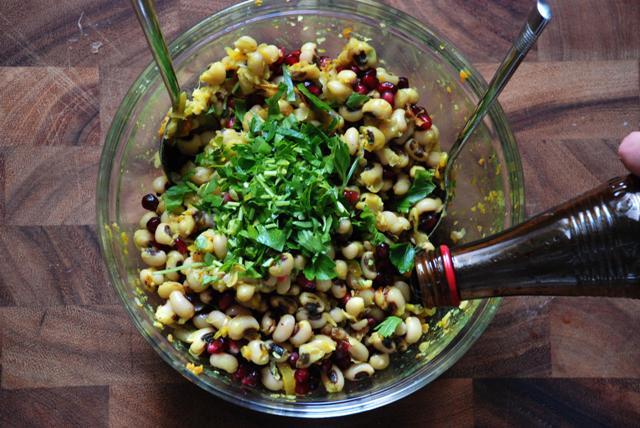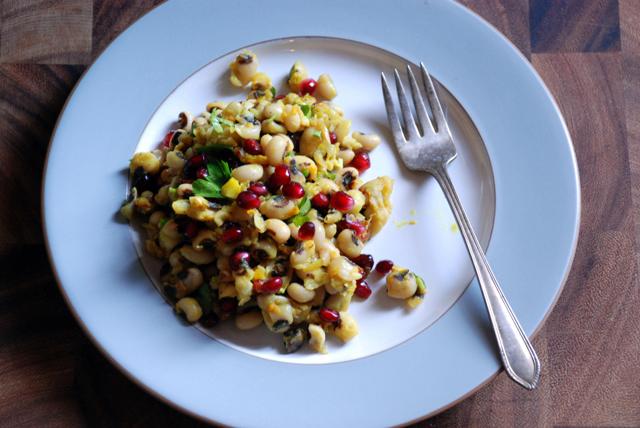Rosh Hashanah is an auspicious time, meant for new beginnings and good luck. We wish people inscriptions in the book of life, say special prayers for health and prosperity, and even wear white, symbolizing purity and cleansing from sin.
I like to put my money where my mouth is: according to Sephardic custom, certain foods – like dates, squash, and pomegranates – are lucky, and should be eaten in abundance on the New Year.
Another one of these auspicious foods is black-eyed peas, which I’ve been eating regularly ever since returning from Southeast Asia this past December. While they aren’t a traditionally Thai or Vietnamese food, they’re a staple in Burma, just over the border from Thailand. With the steady influx of Burmese émigrés to Thailand, vendors have started selling specialties from their hometown on the streets of Chiang Rai, near the border. One of my favorite dishes, which I first encountered in Naomi Duguid’s excellent book Burma, combines black-eyed peas with turmeric, shallots, ginger, and fish sauce. It’s a surprisingly addictive combination.
The Nosher celebrates the traditions and recipes that have brought Jews together for centuries. Donate today to keep The Nosher's stories and recipes accessible to all.
I built on that original recipe in honor of Rosh Hashanah, adding another auspicious food – pomegranate seeds – and some pomegranate syrup, for good measure. I swapped out fish sauce for soy sauce, added a heaping handful of parsley, and finished the dish with a big squeeze of fresh lime.
Because Rosh Hashanah starts so early this year, we’re planning on at least one picnic lunch, to take advantage of what we hope will be good weather. I’m planning to serve this, alongside the usual round challah and apple slices dipped in honey. Double good luck!
Ingredients
1 heaping cup black-eyed peas
2 Tbsp olive oil
1 tsp fresh grated turmeric root or ¼ tsp ground turmeric
1 large shallot, minced
¾ tsp salt
1 tsp soy sauce
2 tsp pomegranate syrup, optional (if not using, double lime juice)
½ cup pomegranate seeds
2-3 Tbsp chopped parsley, chives, or a mixture
Juice of ½ a lime
Directions
If your black-eyed peas are dried, soak them overnight in enough water to cover them by at least 1 inch.
When ready to cook the peas, fill a medium pot with water and bring to a boil. Add drained peas, cover the pot, reduce the heat to low, and simmer until peas are fork-tender, between 45 minutes and 1.5 hours. Cooking time varies drastically and depends on the age of your peas, so check them regularly.
Meanwhile, heat the olive oil in your smallest sauté pan over medium-high heat. Add the turmeric and shallots, and cook for 3-4 minutes, until shallots are soft, fragrant, and browned in spots. Add salt, stir to combine, and remove from the heat.
When peas are soft but still retaining their shape, drain them, transfer them to a bowl, and pour the shallot mixture over the peas, making sure to scrape the sauté pan for all those little bits of turmeric and shallot clinging to the bottom. Stir beans to incorporate, taking care not to smush them too much.
Add soy sauce and pomegranate syrup if using, and toss to combine.
Right before serving, fold in pomegranates, fresh herbs, and lime juice. Serve at room temperature or slightly chilled.
challah
Pronounced: KHAH-luh, Origin: Hebrew, ceremonial bread eaten on Shabbat and Jewish holidays.
Rosh Hashanah
Pronounced: roshe hah-SHAH-nah, also roshe ha-shah-NAH, Origin: Hebrew, the Jewish new year.
Sephardic
Pronounced: seh-FAR-dik, Origin: Hebrew, describing Jews descending from the Jews of Spain.




